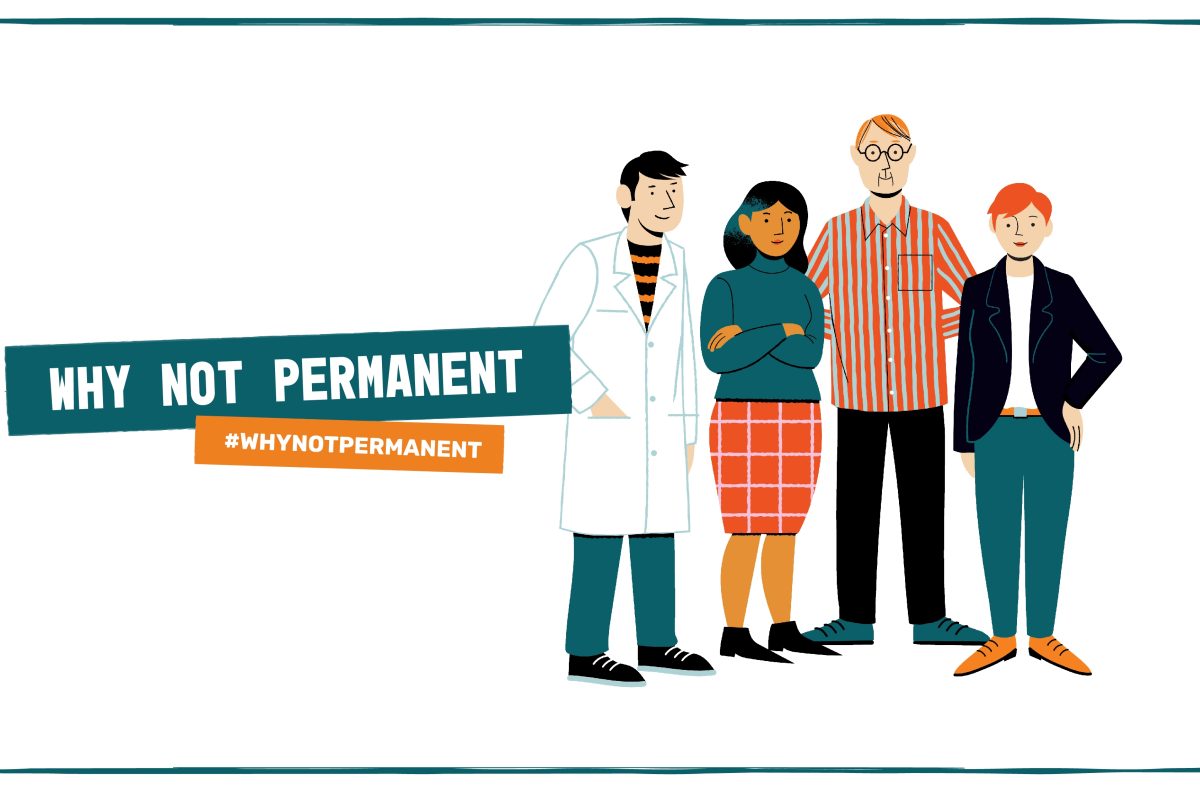
Fixed-term employment
The union helps its members by negotiating with the employer
The Union of Research Professionals and the shop stewards are constantly negotiating with the employer on matters related to fixed-term employment contracts of members, such as turning the employment into permanent or paying compensation at the end of the employment if there were no legal grounds for the fixed-term employment. Upon request, the district court can also verify the employment agreement as valid until further notice, even in the event of a continued employment relationship, if there are no justified grounds for concluding a fixed-term employment contract.
If you have any questions about the grounds for a fixed-term employment contract or other employment-related matters, please contact your local shop steward or the union office.
Justified grounds are always required for fixed-term employment
Chapter 1, section 3 of the Employment Contracts Act states that an employment contract is valid indefinitely unless it has, for a justified reason, been made for a specific fixed term. Under the Employment Contracts Act, therefore, the continuous nature of the employment contract is the basic principle and a fixed-term employment contract is always an exception that requires a justified reason. Remember that there must be a justified reason for each fixed-term employment contract. If there is no justified reason, the employment contract is considered valid until further notice. There must be a legal reason for each fixed-term employment contract.
An employment relationship may also be changed to permanent employment under the tacit extension stated in the Employment Contracts Act, if the employee’s work is allowed to continue after the termination of the fixed-term employment relationship and the employer is aware of this but has not concluded a new employment contract. Such a situation can result from, for example, not concluding a new, fixed-term employment contract until the employee has already worked for the employer for a few weeks, for example.
Same rights as in permanent employment
An employee in a fixed-term employment relationship has the same rights as those whose employment relationship is valid until further notice. For example, fixed-term employment gives equal right to occupational health care and various holidays or leaves.
Fixed-term employment at universities
The large number and consecutive nature of fixed-term employment relationships are a particularly major issue for the university sector. More than 50% of university employees have a fixed-term employment contract. The Union of Research Professionals recommends having the fixed-term employment relationship always cover the entire period of time required for the grounds for fixed-term employment (e.g. the entire period of deputyship). It is tactless towards the employee to only conclude fixed-term employment relationships lasting a couple of months with them while knowing that the project or deputyship in question will, in fact, last several years. Using very brief, fixed-term employment relationships often indicates poor work organisation skills, increases the stress of employees and weakens the university sector’s appeal as a workplace.
Grounds for fixed-term employment contracts at universities
The legal grounds for fixed-term employment contracts may include filling in for another employee or managing an open position.
The fixed-term nature of a position related to dissertation work is always justified, as dissertation work is not intended to continue permanently. However, we recommend ensuring that the doctoral candidate’s fixed-term employment relationship actually covers the entire period of time required by the dissertation work, usually about four years. Basing dissertation work on brief, intermittent employment relationships will only hold up and hinder the research work.
The project-based nature of the work alone is not a legal reason for a fixed-term employment contract if the duration and content of the contract are not actually bound to the duration or content of the project. Moreover, external funding on its own does not constitute grounds for concluding a fixed-term employment contract with the employee. The faculty’s inability to predict their funding situation several years from now is also not a sufficient reason for a fixed-term contract. It is clear that no employer is able to certainly know their funding situation several years in advance, but an employment relationship valid until further notice is, nevertheless, the primary principle in employment legislation.
Consecutive fixed-term employment contracts mean concluding two or more fixed-term employment contracts one after the other. According to the Employment Contracts Act, it is prohibited to use consecutive fixed-term contracts when the number or total duration of fixed-term contracts or the totality of such contracts indicates a permanent need of labour. Unfortunately, consecutive fixed-term employment contracts are very common in Finnish universities.
It is an essential part of academic career planning to actively and personally bring up the possibility of making the employment relationship permanent with the employer. In addition to academic merits, the employee’s prerequisites for working and the terms of employment play a major role in career advancement.
Local and union-level negotiations
According to the General Collective Agreement for universities, fixed-term employment relationships can be negotiated both locally and at the union level. The goal of the negotiations may be to verify the employee’s employment relationship as valid until further notice. Alternatively, the goal may be to agree on compensation resulting from illegally terminating the employment relationship if the relationship has already ended. Negotiations in line with the collective agreement are completely free of charge to the employee. The employee does not personally need to attend local or union-level negotiations; the issue is negotiated by the shop steward or representatives from the union and the Negotiation Organization for Public Sector Professionals JUKO. Negotiating on matters related to fixed-term employment is common at universities, so there is no need to be anxious. In practice, the process starts by contacting the local shop steward.
If the matter cannot be settled through negotiations, it can be forwarded to the district court or the labour court to be settled under the union’s legal expenses insurance. This route can be taken even if the member’s employment relationship with the university has already ended. We recommend that the employee retain all the fixed-term employment contracts for assessing the fixed-term nature of the work.
The legality of a fixed-term employment relationship should be assessed if, for example:
- The employee has had several consecutive fixed-term employment relationships with the same employer
- The employment contracts do not state a reason for fixed-term employment relationships
- “Post doc” or other term indicating a career stage has been recorded as the reason for fixed-term employment contracts
- The employee has worked on the same tasks for a long time but the reason for fixed-term employment recorded in the contracts is “project-based work”
- The employee does not have a valid employment contract but has still continued work at the university under the employer’s approval (tacit extension)
Parental leave, sick leave and fixed-term employment
If the employee is unable to work during fixed-term employment due to parental leave or sick leave, for example, the absence will not, in line with the Employment Contracts Act, automatically extend the fixed-term employment relationship by a period of time corresponding to the absence. However, many universities have a policy whereupon a fixed-term employment relationship can be extended by the period of time corresponding to the employee’s absence, for example parental leave. Contact your local shop steward to learn the policy used at your university.
Fixed-term employment relationship and holidays
University employees who are in a total working time system do not accrue holiday leave as referred to in the Annual Holidays Act. The employees are personally responsible for scheduling their working time so that they have an amount of time off corresponding to annual holiday. As the employees do not accrue days of holiday as referred to in the Annual Holidays Act, they cannot receive holiday remuneration at the end of a fixed-term employment relationship. The employee must personally ensure that they use a sufficient amount of time off corresponding to holiday before the termination of their fixed-term employment relationship.



